The Condition of the Prisoners inside the Provincial Rehabilitation and Reformatory Center Mati City
DOI:
https://doi.org/10.59120/drj.v11i2.370Keywords:
Davao Oriental Provincial Jail, Mati City reformatory, prisoners, spiritual valueAbstract
The condition of prisoners in detention or jails was a big issue for correctional facilities nationwide. This study was conducted to determine the condition of the prisoners inside the Provincial Rehabilitation and Reformatory Center in Mati City. The study aimed to determine prisoners’ physical, emotional, and spiritual aspects inside the Davao Oriental Provincial Jail. Descriptive and quantitative methods were used in this study. The sample consisted of N=131 respondents, 116 of whom were detainees and 15 of whom were inmates. It was determined in the respondents’ socio-demographic profile and prisoners’ information that most respondents were 18 to 60 years old; most of the respondents were catholic, 91 were married, and 40 of them were Catholic. All individuals who participated in this study completed secondary education. Among these respondents, 35 finished secondary schooling. Out of the total, 24 individuals achieved a college education, 18 respondents completed elementary school, and one person graduated from college. The overall condition of inmates is excellent, which means that the inmates were very satisfied, and the overall condition of detainees is also excellent, which means that the detainees were very satisfied in the Rehabilitation and Reformatory Center Mati City. Moreover, in comparing the conditions between inmates and detainees. It showed that all the aspects of the condition between inmates and detainees were the same. Hence, this indicated that the condition of inmates and detainees was the same in terms of their physical, emotional, and spiritual aspects.
Downloads

Downloads
Published
Issue
Section
License
Copyright (c) 2017 Abdul Rahman I. Dadung, Shiela Mae B. Jani , Arvin B. Tambe

This work is licensed under a Creative Commons Attribution-NonCommercial 4.0 International License.
DRJ is an open-access journal and the article's license is CC-BY-NC. This license allows others to distribute, remix, tweak, and build on the author's work, as long as they give credit to the original work. Authors retain the copyright and grant the journal/publisher non-exclusive publishing rights with the work simultaneously licensed under a https://creativecommons.org/licenses/by-nc/4.0/.





